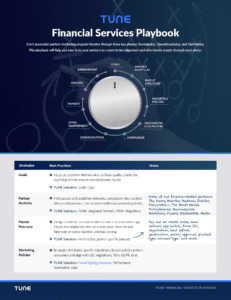Introduction
For banks, insurance companies, loan providers, personal finance publishers, and other financial services brands, affiliate marketing has proven to be a valuable channel for generating leads and acquiring new customers. However, the cost of working through traditional affiliate networks can be a significant burden, as high network fees and hidden service charges eat into profit margins. Fortunately, by eliminating the middleman and managing affiliate partnerships directly, financial brands can both reduce costs and improve ROI.
In this post, we’ll explore strategies for cutting out unnecessary costs in financial affiliate programs. We’ll cover the advantages of taking a direct approach and actionable tips for managing partnerships, plus look at a few case studies from financial brands that have used these strategies to succeed.
Why Traditional Affiliate Networks are Costly for Financial Brands
High Network Fees and Service Charges
Traditional affiliate marketing networks serve as intermediaries between companies and their affiliates, facilitating relationships and managing payments. While these platforms simplify the process of running an affiliate program, they come at a high cost. Financial services companies like banks often find themselves paying hefty commission fees, typically ranging between 20% to 40%, on top of monthly service charges.
For industries with tight margins, such as personal finance or loan providers, these fees can significantly impact profitability. When you add in one-time setup costs and potential overage charges, the true cost of traditional affiliate networks becomes clear.
Lack of Control and Customization
Another downside to working through affiliate networks is the limited control over how your brand is represented. Since networks usually offer generic promotional templates and materials, it’s difficult for financial brands to create personalized, high-impact campaigns. The network interface itself is also restricted to the design and user experience set by the network, making it hard to stand out in a sea of competitors. This can lead to missed opportunities for matching with the right partners and optimizing messaging to capture the attention of a more targeted audience.
By managing affiliate partnerships directly, financial services brands gain greater control over every aspect of their affiliate marketing strategy — from the selection of affiliates, to the terms and conditions of contracts, to the creation of custom marketing materials tailored to specific customer segments.
The Benefits of Eliminating Middlemen in Financial Affiliate Programs
Increased ROI through Direct Affiliate Relationships
Cutting out middlemen offers immediate cost savings, but that’s just the start. Financial brands that manage their own affiliate programs can negotiate commission rates directly with affiliates, leading to more favorable terms. Without the network’s cut, companies have more flexibility to reward affiliates based on performance, which fosters better long-term relationships and incentivizes high-quality lead generation.
Additionally, direct relationships enable financial brands to monitor performance metrics more closely and optimize in real-time. This level of transparency can help businesses make smarter marketing decisions, improve conversion rates, and ultimately drive higher ROI.
Greater Flexibility in Commission Structures
When working with a traditional affiliate network, financial brands are often locked into a standard commission structure. By managing affiliate programs internally, you gain the flexibility to tailor commission rates to specific products or customer segments. For example, a bank could offer higher commissions for affiliates who successfully refer new credit card customers, while offering a different rate for mortgage leads.
This flexibility allows you to align your affiliate compensation with your broader business goals, ensuring that you’re maximizing the return on every dollar spent.
Customization of Campaigns and Messaging
Direct partnerships with affiliates also give financial brands the opportunity to develop custom campaigns that resonate with their target audiences. Instead of relying on the standard, cookie-cutter templates provided by networks, you can create tailored marketing materials that speak directly to potential customers. This is particularly valuable in industries like personal finance, insurance, and banking apps, where trust and credibility are critical to conversion.
Banks, for instance, might develop content specifically designed to highlight their commitment to security and data protection, while insurance companies could emphasize cost savings and personalized coverage options.
How to Reduce Costs in Financial Affiliate Programs
Eliminating middlemen and managing affiliate programs in-house might seem like a daunting task, but with the right approach, it can be both cost-effective and efficient. Below are some practical steps to get started.
1. Invest in Affiliate Tracking Software
Financial brands can leverage affiliate tracking platforms like TUNE, which provide the tools needed to track affiliate performance, manage payments, and automate workflows. These platforms are more affordable in the long run when compared to the total cost associated with large affiliate networks, and they give you the control you need to run a successful program.
2. Vet Affiliates Carefully
Take the time to identify partners who are truly aligned with your brand’s values and target audience. Focus on affiliates with established authority in the finance space, such as personal finance bloggers, financial influencers, or comparison websites for loans and insurance.
Look for affiliates who have a proven track record of generating high-quality leads, rather than relying on volume-driven, low-conversion tactics.
3. Offer Performance-Based Incentives
Rather than sticking to a flat commission model, consider offering tiered rewards based on performance. For example, offer higher commissions for affiliates who consistently bring in high-converting leads or premium customers. This approach encourages affiliates to focus on quality rather than just quantity.
4. Prioritize Transparent Reporting
Ensure that your affiliate partners have access to transparent, real-time reporting on their performance. By providing regular feedback and insights, you can build a stronger relationship with your affiliates and encourage ongoing optimization of their promotional efforts.
5. Create Custom Marketing Materials
Collaborate with your affiliates to create custom marketing materials tailored to your audience. Whether it’s exclusive financial guides, loan calculators, or email templates, offering unique content helps affiliates promote your services more effectively. In turn, this leads to higher conversion rates and lower customer acquisition costs.
Financial Services Case Studies
Financial services companies of all sizes and specialties have found success with affiliate marketing and TUNE. Here are just a few examples of how different companies achieved their goals using the strategies outlined above:
- How Topstep Scaled Affiliate Revenue by 66%
- How Credit Sesame Boosted Program ROI via Optimization
- How Gabi’s Affiliate Program Took Off After Switching Platforms
Conclusion
Insurance companies, banks, loan providers, personal finance apps, and other brands can significantly reduce the costs of financial affiliate programs by managing partnerships directly and eliminating unnecessary middlemen. Not only does this lead to lower fees, but it also provides greater control over campaigns, the flexibility to customize commission structures, and the ability to foster long-term relationships with top-performing affiliates.
To learn more about performance-based advertising, download TUNE’s Ultimate Guide to Partner Marketing, over 50 pages of everything you need to know to run a successful program. Don’t forget to download the supplement made specifically for financial services companies, which walks through common affiliate marketing pain points and their solutions here.
When you’re ready to get started with the best platform for financial services affiliate marketing, request a demo of TUNE.
Author
Becky is the Senior Content Marketing Manager at TUNE. Before TUNE, she handled content strategy and marketing communications at several tech startups in the Bay Area. Becky received her bachelor's degree in English from Wake Forest University. After a decade in San Francisco and Seattle, she has returned home to Charleston, SC, where you can find her strolling through Hampton Park with her pup and enjoying the simple things between adventures with friends and family.




